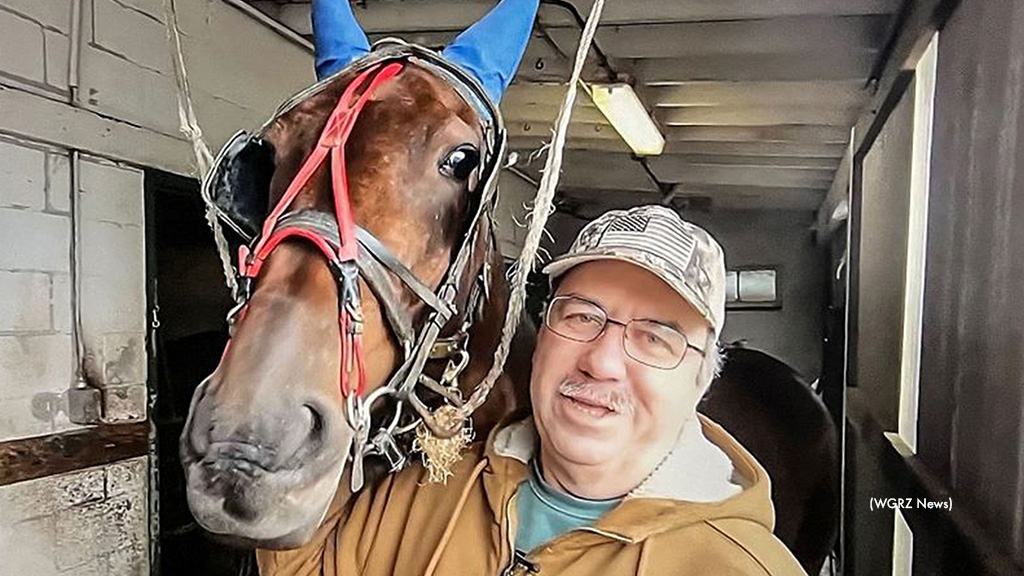
When Jim Urtel Jr. was 12, he fell in love with horses and harness racing. In the ensuing years, he enjoyed operating a small stable, often with his father, while also working for several other trainers, primarily in western New York and Pennsylvania.
Thirty years after jogging and training his first horse, though, Urtel was forced to give up his days at the barn. The Batavia, New York resident was diagnosed with kidney failure in 2012 and spent eight years on dialysis while waiting for a kidney donation. He finally received a transplant from a deceased donor in 2020, but the kidney has not functioned as hoped, leaving Urtel in need of another transplant.
As he waits again, Urtel draws inspiration from the horses that were a big part of his life, even if he is unable to spend much time with them now.
“When you get a good old classy horse, you call them a warhorse,” said Urtel. “They need help to get by, but they keep going. That’s kind of what I am now. I’ve got to play that part. I need a little help, but I keep trying to fight and keep going with it all.”
Urtel’s fight began 11 years ago when he visited the emergency room thinking he might have bronchitis.
“I had been having trouble breathing when lying down and went thinking I needed an antibiotic,” said Urtel. “They did a bunch of tests and told me my kidneys were in complete failure and my blood pressure was 232/112. Diabetes is the main cause for kidney failure, but blood pressure is No. 2. It’s amazing it didn’t get me.”
Prior to his diagnosis, Urtel had been training a horse for his dad and working for another stable at Batavia. Urtel had been introduced to racing by his father, first as a fan.
“I always went to the track with him and watched the races,” said Urtel. “My father had a friend named Bill Verney, who raced horses back then, and he had a farm near us and told us to stop by. I was 12 years old. He let me jog my first horse. Then you’re done. You’re hooked for life once you get into that.
“Basically, from the time I was 12, my father always had horses. He’d have one or two at a time, they were always like a little side thing. He had a lot of cheaper horses, but through the years we learned with them. We had a lot of horses [with issues] that we would bring back and win races with at Batavia and Buffalo.”
Urtel’s fondest racing memories involve horses he had with his dad, such as trotter T C Express, who was a seven-time winner on the Batavia-Buffalo circuit in 2007, and Holly Views Nat, who was a winner for Urtel when he was at Pocono Downs.
“I miss the horses immensely every day,” said Urtel. “I spent a lot of time with them. I’d go to the barn and sit with them and walk them and talk to them. They’re not going to talk back, but they listen. I had always had that feeling with them. They know.”
Urtel’s focus now is on maintaining his health — he’s lost more than 50 pounds thanks to a fitness plan — and remaining positive as he waits for another kidney transplant.
“For everything I’ve been through, I’m lucky,” said Urtel. “I spent eight years in dialysis looking at people who aren’t with us anymore. I lost so many people in there. When you go through all that, it changes your outlook on a lot of things. I’m not the only guy out there with problems. You have to keep doing what you can do while you’re here. Maybe I can inspire a few people. You just keep positive.”
Urtel is working with Kidneys for Communities in the hopes of finding a living donor in the near future. The non-profit organization looks to connect living donors and recipients by harnessing the power of their shared communities. Those could be family, friends, colleagues, faith-based institutions or any number of other groups.
“Ninety-six per cent of donations in the U.S. have been made to people that the donor knows or identifies with,” said Atul Agnihotri, the CEO of Kidneys for Communities and himself a kidney transplant recipient. “Most patients don’t know what to do when they have a kidney failure. They don’t know where to look for help. That’s where we come in.”
Kidneys for Communities offers support and benefits packages to prospective donors. Donors do not have to live in the same geographic area as recipients, nor do they have to be a direct match to a specific recipient. Roughly 33 per cent of willing donors are incompatible with their intended recipient, but through paired donations, matches can be made from a pool of pairs in the same situation.
“Any form of kidney donation is the highest form of gift that one can give,” said Agnihotri.
To visit Jim Urtel’s page on the Kidneys for Communities website, click here. If you are interested in determining whether you could be a donor, the process begins with an online questionnaire, which can be found here. Potential donors are under no obligation and can withdraw from the process at any time. To watch a recent interview with Urtel at Batavia Downs on NBC affiliate WGRZ in Buffalo, click here.
(USTA)

